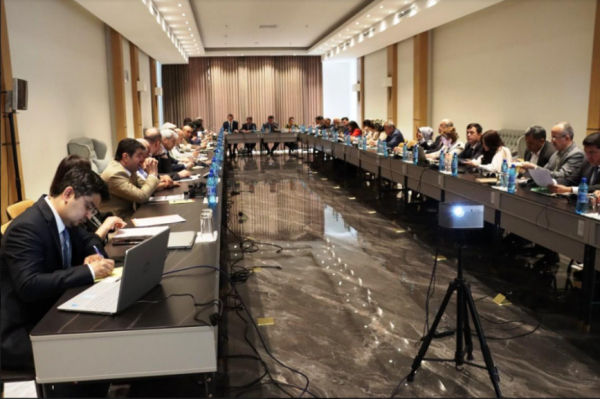ITC’s GTEX project reports on the results and impact of its activities in the Tajik textile and clothing sector
The role and contribution of the International Trade Center (ITC) to the textile and clothing sector of Tajikistan, the results of the Global Textiles and Clothing Program (GTEX) project in 2021, and the project work plan for 2022 were discussed at the next meeting of the Project Steering Committee (PSC) held in Dushanbe on April 20.
ITC National Office in Tajikistan says the PSC consists of representatives from Tajikistan’s relevant ITC ministries, private sector, academia, in addition to international counterparts: the government of Switzerland (the donor country), and the International Trade Center. The committee aims to ensure transparency in the implementation of the project as well as to guide the project’s outputs towards the country’s priorities.
The GTEX program is funded by the State Secretariat for Economic Affairs (SECO) of the Swiss Confederation and aims to increase the export competitiveness of the Tajik textile and clothing sector by supporting sector companies, and relevant trade support institutions from both public and private sectors. Since the start of the project the beneficiary companies in Tajikistan has shown more than USD 30M cumulative overall export performance.
Mr. Abdurahmon Abdurahmonzoda, Deputy Minister of Economic Development and Trade of Tajikistan, emphasized ITC’s input in the works of the Coordinating Committee on Facilitation of Trade Procedures (CCTF), including simplification of textile and clothing sector procedures: “The fourth strategic goal of the Republic of Tajikistan is accelerated industrialization and our partners from the Government of Switzerland and ITC assist us in accomplishing new achievements in this direction, especially in development of textile and clothing sectors in the country. Our long-term cooperation led to delivering significant outcomes, including sustainable functioning of the Permanent Technical Secretariat of the CCTF, development and launch of the Tajikistan Trade Portal, and we believe that this fruitful cooperation will continue in the future.”
Mr. Armen Zargaryan, ITC’s Program Coordinator for the Office for Eastern Europe and Central Asia, highlighted some of the project’s results achieved last year. “With our support the Tajik textile and clothing sector was able to improve its competitiveness and expand exports to new regional markets. The project support led to more than 1,500 new business contacts and 24 new export contracts with foreign companies only in 2021 through participation of national companies in international trade fairs and study tours.”
Furthermore, the GTEX project has also assisted other local entities, such as educational and trade support institutions. “We launched the second Garment Training Centre in the country, this time in the country’s second biggest city, at the Khujand Polytechnic Institute of Tajik Technical University. These centers have already provided new modern design and sewing skills to tens young students and women and serve as excellent platforms to empower local women to acquire immediate income-generating knowledge. This incredible initiative also creates a bridge between academia and the clothing industry” concludes Mr. Zargaryan.
Originally scheduled to end in 2021, support of the GTEX program has been extended for two more years by the donor, the Government of Switzerland, aiming to help the Tajik textile and clothing industry to overcome the negative impact of the COVID-19 pandemic. The GTEX continues to assist the Tajik companies to restore international business contacts and supply chain, to strengthen the service providers’ capacity, to support digitalization initiatives, as well as to promote the social responsibility and ecological sustainability principles among its local partners.
Mr. Martin Peter, Deputy Head of the State Secretariat for Economic Affairs (SECO)’s Trade Promotion Division, believes that the decision to extend duration of the cooperation under this project was the right one in order to combat the economic consequences of the Covid-19 pandemic in the sector: “We are now convinced that this decision was the right one, as the project supported a strong rebound of export volume and the numbers of SMEs trading internationally and the fact that supported Trade Support Institutes (TSIs) are becoming stronger institutionally. All of this comes despite the still very challenging circumstances and another crisis ahead. We would therefore like to thank and congratulate the colleagues at ITC as well as all partner TSIs and companies on their great efforts, and encourage them to continue the good work in the face of adversity.”
The GTEX MENATEX program is funded by the State Secretariat for Economic Affairs (SECO) of the Swiss Confederation focusing on five priority countries (Egypt, Morocco, Kyrgyzstan Tajikistan and Tunisia). The program aims to encourage exports of textiles and clothing from developing countries to promote employment and income generation throughout the value chain.
This year the Swiss Cooperation Office in Tajikistan marks 30th year of the establishment of diplomatic relations between Switzerland and Tajikistan. Over the last 30 years, around 500 million USD have been allocated in the form of grants to the Government of Tajikistan and the Tajik population. Within its Cooperation program for Central Asia (2022-2025), Switzerland will focus on supporting economic, social and democratic development, promoting an integrated and regional approach in the complex field of transboundary water management, strengthening economic ties and promoting good governance.

Комментарии (0)